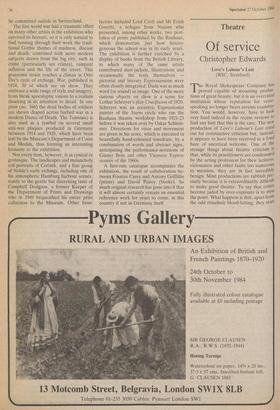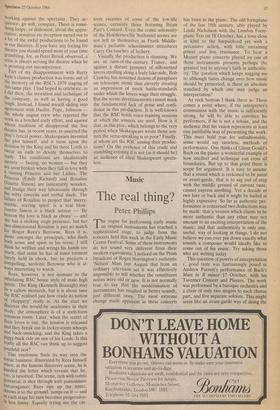Theatre
Of service
Christopher Edwards
Love's Labour's Lost (RSC, Stratford)
The Royal Shakespeare Company has proved capable of mounting produc- tions of great beauty, but it is an overrated institution whose reputation for verse- speaking no longer bears serious examina- tion. You would, however, have to look very hard indeed in the recent reviews to find any hint that this is the case. The new production of Love's Labour's Lost cried out for constructive criticism but, instead, it appears to have been received in a fond haze of uncritical welcome. One of the strange things about theatre criticism is that, while its practitioners are condemned by the acting profession for their laziness, viciousness and other faults too numerous to mention, they are in fact incredibly benign. Most productions are rubbish pre- cisely because it is extraordinarily difficult to make good theatre. To say that critics become jaded by over-exposure is to miss the point. What happens is that, apart from the odd ritualistic blood-letting, they start Working against the spectator. They ac- quiesce, go soft, conspire. There is some- thing loopy, or dishonest, about the appre- ciative, sensitive etc reception meted out to a lot of the awful productions to be found in our theatres. If you have any feeling for theatre you should spend most of your time grumbling, for, as Peter Brook observed, a' critic is always serving the theatre when he is pointing out incompetence. Part of my disappointment with Barry Kyle's clumsy production was borne out of the memory of the RSC's 1979 staging of this same play. I had hoped to celebrate, as I did then, the invention and technique of the company, as well as having a good laugh. Instead, I found myself sliding into agreement with Hazlitt, Pope, Johnson the whole august crew who rejected the work as a botched early effort, and against whose tradition of disapproval the live theatre has, in recent years, re-asserted the Play's lyrical power. Shakespeare invented the plot himself, and it turns upon the decision by the King and his three Lords to swear an oath to devote themselves to study. The conditions are idealistically austere — fasting, no women — but they are soon broken when they fall in love with a visiting Princess and her Ladies. The Princess (Emily Richard) and Rosaline (Josette Simon) are lamentably wooden, and trudge their way laboriously through the witty conceits and verbal duels. The failure of Rosaline to project that 'merry, nimble, stirring spirit' is a real blow. Josette Simon is a black actress — 'By heaven thy love is black as ebony' — and she has a striking stage presence, but her two-dimensional Rosaline is just no match for Roger Rees's Berowne. Rees it is, alone amongst the principals, who finds both sense and spirit in his verse. I still think he writhes and wrings his hands too much, that sense he has of inner torment barely held in check, but he projects a compelling, sardonic Berowne who is al- ways interesting to watch. Rees, however, is not immune to the infuriating RSC house style of male high spirits. The King (Kenneth Branagh) may be a callow monarch, but it is about time the RSC realised just how crude its notion of `chappery' really is. At the start we discover the would-be academics in their study; the atmosphere is of a sixth-form common room. Later, when the secret of their loves is out, the tension is released and they break out in locker-room whoops and back-smacking, and the King takes a Piggy-back ride on one of his Lords. Is this really all the RSC can think up to suggest Youthful zest?
This crudeness finds its way into the comic business, illustrated by Rees himself when, in the famous discovery scene, he is handed the letter which reveals that he, too, is besotted. The scene, rich with comic Potential, is shot through with pantomimic extravagance; Rees rips up the letter, throws it to the ground, jumps on it — and at each stage his turn becomes progressive- 1Y less funny. Equally trying are the car-
toon excesses of some of the low-life scenes, certainly those featuring Brian Parr's Costard. Even the comic solemnity of the Holofernes/Sir Nathaniel scenes are not left to themselves as Frank Middle- mass's pedantic schoolmaster introduces Carry On touches of lechery.
Visually the production is stunning. We are in turn-of-the-century France, and against a distant prospect of silhouetted lovers strolling along a leafy lake-side, Bob Crowley has mounted dozens of parapluies on telescopic stern's thus cleverly creating an impression of mock battle-standards under which the lovers wage their struggle. But the scenic divertissements cannot mask the fundamental lack of poise and confi- dence in this production. It is well-known that the RSC holds voice-training sessions at which the sonnets are used. How is it that, in this play, which belongs to the very period when Shakespeare wrote those son- nets the verse-speaking is so poor? Finally, at whom are the RSC aiming their produc- tions? On the evidence of this crude and stumbling evening it is not (as it should be) an audience of ideal Shakespeare specta- tors.



















































 Previous page
Previous page